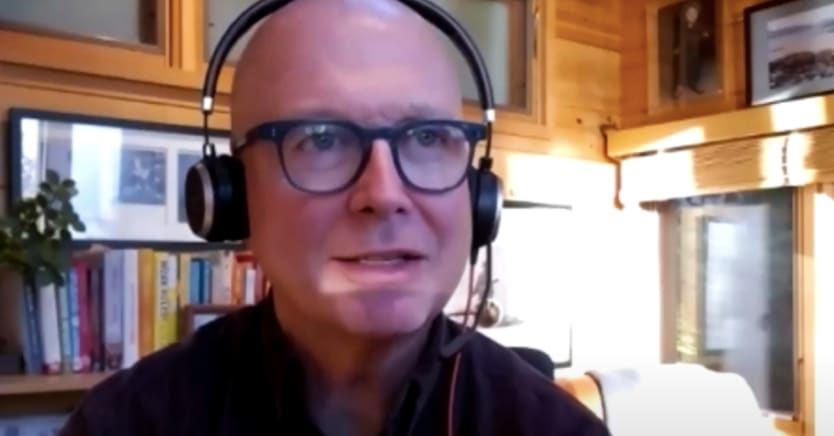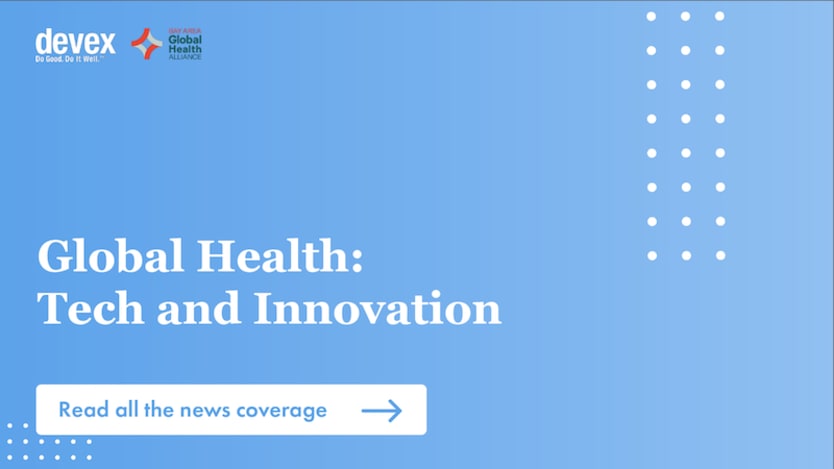
The COVID-19 pandemic has sparked an explosion of digital health innovations, but often they are not reaching the people who need them most.
Sign up for Devex CheckUp
The must-read weekly newsletter for exclusive global health news and insider insights.
This offers a “unique moment of opportunity” to rethink global health innovation, governance, and collaboration, said Steve Davis, senior China strategy adviser, and interim director for the China country office at the Bill & Melinda Gates Foundation.
“There really are serious conversations taking place around what we have to do differently, what we didn't do right, what we need to do better. But also, some of the fundamental assumptions we made for a while need to be revisited,” Davis said at an event for Devex Pro subscribers on Tuesday, the final day of the World Health Assembly.
Davis outlined opportunities to revisit traditional ways of working — from digital health tools, intellectual property to global health partnerships.
Supporting equitable distribution of innovations
While the world has created safe and effective vaccines at record speed, there is gross inequity in distribution, and that problem extends from vaccines to digital health innovations, Davis said.
“The private sector is going to be driving so much of the innovation here,” he said.
“But I do think it’s important to say, in certain contexts, you put different solutions on the table. In desperate times, we take measures that are appropriate for those times.”
— Steve Davis, senior China strategy adviser and interim director for the China country office, Bill & Melinda Gates Foundation.Davis, former CEO at PATH, a global health innovation NGO, said there’s a need to create mechanisms that will fund and support commercially driven tools with potential for global health and international development impact. As an example, he mentioned Gavi, the Vaccine Alliance, the international organization to improve global access to vaccines.
“I don’t think we need a Gavi for digital. I’m not suggesting we need a new institution. But there are lessons we can learn from that,” Davis said.
While digital health tools work differently than vaccines, he said, the space could benefit from a mechanism to provide financing, as well as a distribution platform, to support access to technology.
Putting ‘different solutions on the table’
When Davis was at PATH, he was very engaged in the debate around the role of IP in access to medicines — which has become increasingly polarized.
“It’s a tool,” he said. “It’s not a value.”
Watch: Inside WHA74 with the Gates Foundation's Steve Davis
The Gates Foundation's senior strategy adviser Steve Davis and Devex's specialist reporters catch up on key takeaways from the 74th World Health Assembly.
Davis was asked about the Gates Foundation’s statement in support of a narrow waiver for COVID-19 vaccines IP during the pandemic. He said he did not want to speak on behalf of the Gates Foundation. Davis said the decision is now in the hands of the World Trade Organization.
“But I do think it’s important to say, in certain contexts, you put different solutions on the table,” he said. “In desperate times, we take measures that are appropriate for those times.”
Davis also noted that the IP waiver is just the first step since it takes a long time to develop a supply of safe and effective vaccines.
“This is not a magic bullet on any level,” he said.
Pursuing trisector partnerships
How funders can best work with governments to scale innovation
A session at the 2021 Skoll World Forum explored how external funders can navigate partnerships with governments to scale impactful innovation in the public sector.
Davis said he believes in the power of “trisector partnerships,” which bring together the private sector, government, and social sector. But he noted there are times when partnerships are not the right solution.
“We have to be prudent about if the partnership is the right tool for the right response for the right moment,” Davis said.
Reflecting on a call earlier Tuesday with the World Health Organization’s digital health technology advisory group, which Davis co-chairs, he said one of the big questions is how to bring the private sector, governments, and multilateral institutions together to ensure access to digital health tools.
“There are two things I worry about,” he said.
One is how to develop standards, in terms of interoperability, privacy, and governance for digital health tools, Davis said. The second is, “And how do we enable them to get to people that need them most through some sort of mechanism?” he said.
This coverage, presented by the Bay Area Global Health Alliance, explores the intersection between technology, innovation, and health. How are tech, innovation, and cross-sector partnerships being leveraged to accelerate equitable access to health care?









